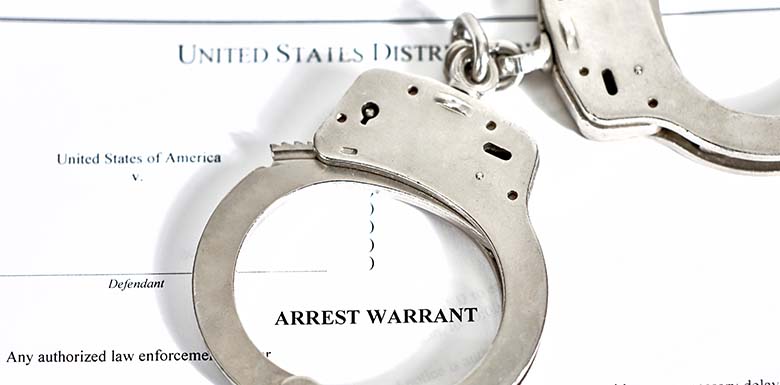
When a warrant is issued for your arrest, a court has authorized law enforcement to arrest you because they have probable cause to believe you committed a crime. Once an arrest warrant is issued, it will remain active until you are arrested, which can happen at any time or place.
If you fail to appear in court on a scheduled date, a bench warrant can be issued for your arrest, even if you didn’t receive the notice. No matter what alleged offense you have a warrant for, here is some important information you should know about responding to the warrant and getting legal help.
How to Find Out if You Have a Warrant for Your Arrest
The easiest way to check for an outstanding arrest warrant is to search online databases. However, not all warrants are immediately available in public records, so it’s important to use multiple methods:
Search the Florida Department of Law Enforcement (FDLE) Database
The best way to find out if you have a warrant out for your arrest in Florida is to search the Florida Department of Law Enforcement’s Wanted Persons database. The online search is free and will list the offense for which the warrant is issued as well as the reporting agency or county.
Check Local Law Enforcement Websites
Some county sheriff’s offices and police departments maintain their own databases of outstanding warrants. Searching the sheriff’s office website in the county where the alleged offense occurred may provide up-to-date information.
Contact the County Clerk’s Office
The Sarasota County Clerk of Court has records of warrants related to criminal cases, missed court dates, or probation violations. If your name appears in their system, a warrant could be active.
Speak with a Criminal Defense Lawyer
If you suspect you have a warrant but cannot confirm it online, a defense attorney can conduct a discreet search on your behalf. An attorney can also provide guidance on the best course of action to resolve the warrant.
Why an Arrest Warrant Might Be Issued
An arrest warrant can be issued for several reasons, including:
- Failure to Appear in Court: If you miss a required court date, a bench warrant may be issued for your arrest, even if you did not receive a formal notice.
- Criminal Charges: If law enforcement has probable cause to believe you committed a crime, a judge may issue a warrant for your arrest.
- Probation Violations: Violating the terms of your probation—such as failing a drug test, missing required meetings, or committing another offense—can result in a warrant.
- Unpaid Fines or Court-Ordered Obligations: If you fail to pay child support, court fees, or restitution, the court may issue a warrant to compel compliance.
What to Do If You Have a Warrant in Florida
If you have an active warrant, avoiding law enforcement will only make matters worse. The longer you wait to address the situation, the greater the potential consequences.
Contact a Criminal Defense Attorney Immediately
An criminal defense lawyer in Florida can help you understand the charges against you, assess the best course of action, and potentially arrange for the warrant to be lifted or resolved without you spending unnecessary time in jail. In some cases, a lawyer can negotiate a walkthrough bond, which allows you to post bail and avoid being taken into custody.
Plan Your Surrender Carefully
If you need to turn yourself in, proper planning can reduce the time you spend in jail and prevent an unexpected public arrest. Consider the following:
- Turn yourself in at the correct jurisdiction. If you appear at the wrong location, you may be detained longer while awaiting extradition.
- Choose the best time to surrender. In Florida, it’s generally best to turn yourself in early in the morning on a Tuesday, Wednesday, or Thursday to ensure you are processed quickly and see a judge as soon as possible.
- Arrange for bail in advance. If bond is available, having a bail bondsman lined up can help you secure a faster release.
Exercise Your Right to Remain Silent
If you are taken into custody, do not answer questions from law enforcement without your attorney present. Anything you say can be used against you in court. Simply state that you wish to remain silent and request legal counsel.
Avoid Public Arrest and Embarrassment
If you do not handle the warrant proactively, you could be arrested at work, at home, or during a routine traffic stop. Voluntarily turning yourself in prevents a potentially humiliating scene and gives you more control over the process.
Why Acting Quickly Matters
The longer a warrant remains unresolved, the worse the potential consequences become. Ignoring a warrant can lead to:
- Additional criminal charges for evasion
- Denial of bail or higher bond amounts
- More time spent in police custody before your hearing
- Possible extradition if you are arrested in another county or state
By addressing the warrant proactively, you improve your chances of minimizing penalties and securing a favorable legal outcome.
Need Legal Help? Contact a Florida Criminal Defense Attorney Today
If you or someone you know has an arrest warrant out in Florida, don’t wait to contact a criminal defense attorney. Partnering with a lawyer can help you understand your rights and decide the best course of action to resolve the warrant properly and efficiently.
To get started on your case, call Erika Valcarcel, Criminal Defense Lawyer, P.A. at 941-363-7900 today.
View All Blogs

